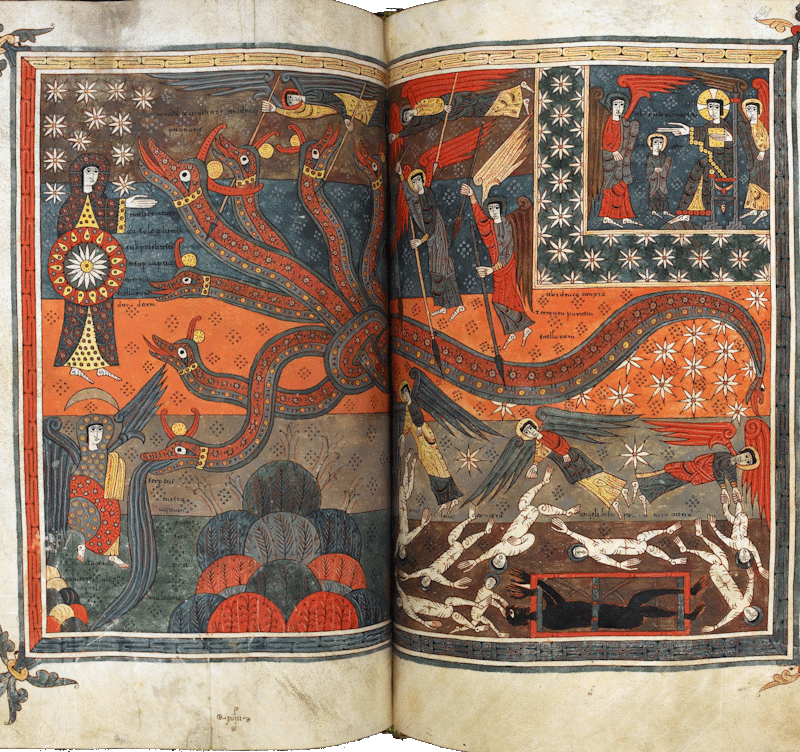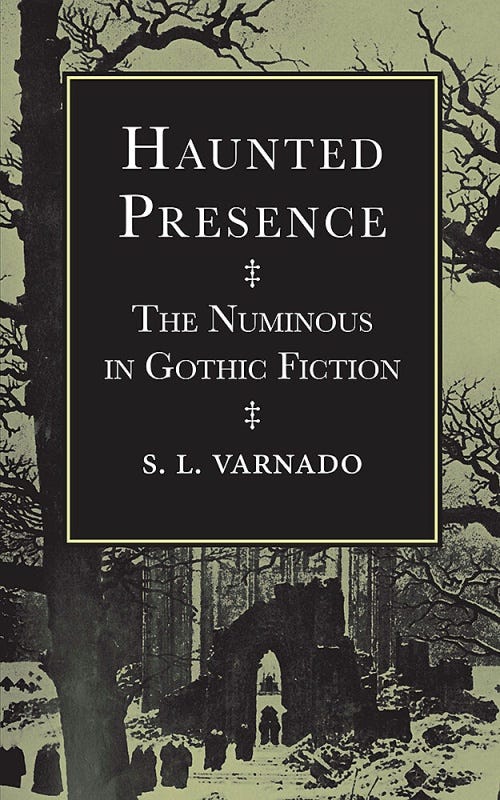Religion, Horror, and the Supernatural: A Recommended Reading List
Five (plus one) books on the convergence of horror and the numinous
I was recently invited by the book recommendation website Shepherd.com to discuss the “five best books” on any theme of my choice, as related to one of my own published books. It will probably not surprise readers of either this newsletter or my other work to learn that I chose religion, horror, and the supernatural (which, coincidentally, is the title of a college course I once developed and taught). As I state in the brief bio that I wrote for the Shepherd piece, both as a writer and a human being I hold a special focus on the mutual implications of religion, horror, and creativity, all of which seem to arise from and lead back to the same ultimate mystery.
You can click through the image below, provided by Shepherd, to read the full text of what I wrote, which includes paragraph-length commentaries on each of my selected titles:
Especially for you, my LITD audience, here is an abridged and modified version, containing some extra comments and info, of my more extended comments on the other side of the link:
Rudolf Otto’s classic The Idea of the Holy, first published in 1917 and bearing the formidable subtitle “An Inquiry into the Non-Rational Factor in the Idea of the Divine and Its Relation to the Rational,” introduced the concept of the numinous and serves as a veritable skeleton key for understanding the fundamental relationship between religion, horror, and the supernatural. If you were to pick just one book to read on the subject, I would recommend this one.
Contrary to the reigning popular image, William Peter Blatty’s The Exorcist is an overtly Christian novel, written with a consciously Christian intent. I find it strange that this fact has been mostly forgotten or obscured in general public memory. But regardless of your religious or non-religious persuasion, it is a book whose “classic” status is well-deserved, as much for its cultural impact, which of course operates in tandem with its movie adaptation, as for its own content. It is thus entirely worth reading or, as in my own case, rereading, which is something I plan to do in the rapidly approaching new year.
If Otto’s book is a skeleton key for understanding religion and horror in general, then Edward J. Ingebretsen’s Maps of Heaven, Maps of Hell: Religious Terror as Memory from the Puritans to Stephen King is a skeleton key for understanding the supernatural-horrific underside of American religion and the American psyche in particular. And even aside from that, the book is thoroughly endearing for its inclusion of a chapter titled “The Shape of the Dark: Robert Frost and H. P. Lovecraft,” which is, yes, devoted to a comparative discussion of these two writers and their work.
Victoria Nelson’s exhilarating The Secret Life of Puppets argues that the innate human religious-visionary impulse is A) ineradicable and B) now creeping through the “back door” of popular horror, fantasy, and science fiction entertainment in an age when Platonic mysticism and vital religious/spiritual vision and experience have been booted out of above-board, mainline, “respectable” intellectual discourse. Thus, works of speculative fiction, both literary and cinematic, increasingly serve as religious texts. At one point Nelson states cryptically that her book evolved into a “Lovecraftian entity” during the long years it took her to birth it, so caveat lector.
Beal’s Religion and Its Monsters shows a contemporary scholar of religion skillfully and insightfully applying Otto’s concept of numinous religious dread to a well-considered selection of classic and contemporary horror texts, thus enabling the reader to see the religion in horror, and vice versa.
At one point as I was brainstorming this list of recommendations, I realized that I had accidentally come up with six titles instead of five. Since five represents a hard limit in Shepherd’s format, I was forced to make some judgment calls. In the end I decided to keep the five books named above, but I’m still not entirely sure this was the right choice, as the one that I excluded really deserved to be listed alongside the others. I will use my space here to rectify that omission:
S. L. Varnado’s Haunted Presence: The Numinous in Gothic Fiction, published in 1987, represents the first book-length application of Otto’s idea of numinous dread to the literature of horror and the Gothic. This means Beal’s Religion and Its Monsters, which came out in 2002, can be understood on one level as a kind of descendant of Varnado’s pioneering work. But whereas Beal wrote as a scholar of religion, Varnado wrote as a scholar of literature. The result is at least equally fascinating.
Varnado opens with separate chapters on the literature of the supernatural in general, the concept of the numinous, and the Gothic novel. He then presents individual chapters on Frankenstein, Poe, Henry James, Dracula, and “the modern period,” the latter of which includes discussions of such seminal weird horror writers as Machen, Blackwood, and Lovecraft. He ends with a chapter devoted to “Analyzing the Mysterium Tremendum,” which is just one among several chapter titles that are capable of igniting strong interest in their own right. Others include “Poe and Initiation into the Sacred,” “The Numinous Aesthetic of Henry James,” and “The Daemonic in Dracula.” Throughout, Varnado’s point is to explore, expound, and illustrate his thesis, which he states directly in the first chapter: “I shall argue that the area of reality that Otto called the numinous — the feeling of the supernatural — stands at the center of Gothic literature.” These 35 years after Haunted Presence’s publication, the book offers what is still, for my money, the single most effective, accessible, and compelling summary and distillation of Otto’s thought, along with one of the best explanations and delineations of the crucial embeddedness of the numinous at the very heart of horror literature.
On a parting note, if Shepherd’s approach of inviting authors to curate recommended reading lists that are thematically connected to their own books strikes you as interesting, be advised that they feature multiple lists that intersect with focal themes here at Living into the Dark, many of them written by notable authors. Examples include “The best books of modern Lovecraftian horror,” written/curated by Paul StJohn Mackintosh; “The best books on why religion—and spirituality—are still around in the 21st century,” written/curated by Elaine Pagels; and “The best books that reflect a grim view of the world, and those beyond,” written/curated by my friend and colleague T. E. Grau, who, back in the day, contributed some essays to The Teeming Brain.






Started reading Varnado's Haunted Presence earlier in the week - his explanation of Otto's conception of the Numinous is summarised well - whether or not I shall agree with the Gothic as having a morality I look forward to finding out since I would be of the opinion that the essence of the Gothic is the absence of a clear cut (ie instructional) morality & rather an exploration of the grey areas of morality which creates questions that are far more complex than those found in the works that have a more straightforward moral perspective - either way thanks for drawing my attention to it as I probably wouldn't have found it otherwise
I found these great quotes translated from Das Gefühl des Überweltlichen (sensus numinis) by Rudolf Otto in Todd Gooch's Numinous And Modernity. I don't believe that book is available in english otherwsie. It basically confirmed what I long suspected Rudolf Otto to have thought,
Gooch says, "Otto claims that, on the contrary, the origin of the gods must be sought in the unfamiliar and uncanny. It is precisely when the gods become too familiar that they begin to loose (sic) their religious power, as was the case, for example, in ancient Greece." then he quotes Otto "Where the goddesses and gods became all-too noble and all-too charming and all-too human-like, belief in them was not at its highpoint, as one would have to assume according to the doctrine of anthropomorphism"
Rudolf Otto also said, "The pictures of the gods of the world, brought together in one heap, would put to shame all of today's museums of futuristic artists in terms of the imagination (Fantastik), strangeness and inexhaustibility of the wholly means of expression of the wholly unfamiliar (des ganz Befremdlichen) that they display. If the oxen strove to see their gods as oxen, humans would appear on the contrary to have had quite the opposite ambition, portraying their gods as half or whole cows, calves, horses, crocodiles, elephants, birds, fish, as marvelous hybrids, hermaphrodites and hideous beings, as weird, confused forms (Schling- und Zeichen-gebilde) and who knows what else.
In Idea of the Holy, Rudolf Otto is like daemonic dread is pivotally important to the development of the holy, but even though there is a remnant at the highest levels, religion evolves away from it. He seemed to be saying two different things at once. These quotes from another of Otto's books really show his true feelings on the topic.